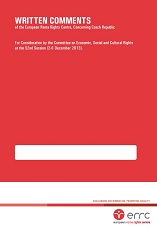WRITTEN COMMENTS OF THE EUROPEAN ROMA RIGHTS CENTRE, CONCERNING ROMANIA (For Consideration by the Committee on the Rights of the Child at its Pre-session Working Group for the 75th Session 3-7 October 2016)
WRITTEN COMMENTS OF THE EUROPEAN ROMA RIGHTS CENTRE, CONCERNING ROMANIA (For Consideration by the Committee on the Rights of the Child at its Pre-session Working Group for the 75th Session 3-7 October 2016)
Author(s): Author Not Specified
Subject(s): Education, International Law, Human Rights and Humanitarian Law, Evaluation research, Social differentiation, Ethnic Minorities Studies
Published by: European Roma Rights Center
Keywords: Romania; Roma; human rights; Romani children; education; discrimination; housing;
Summary/Abstract: The European Roma Rights Centre (ERRC) respectfully submits a list of issues concerning Romania for consideration by the Committee on the Rights of the Child (CRC) at its pre-sessional Working Group for the 75th Session, which will be held from 3rd to 7th October 2016. The ERRC has undertaken regular monitoring of the human rights situation of Roma in Romania and this list of issues reflects the current priorities in our work in Romania. According to current unofficial estimates, Roma in Romania make up approximately 9% of the population (approximately 1,850,000). However, a verified and accurate count remains elusive. According to the final results of the 2011 Census of the Population and Households published on 4 July 2013 by the National Statistics Institute, Romania had a total population of 20.12 million. Among the 18.88 million respondents who self-reported their ethnicity, 621,600 were Roma (3.3%, an increase from 2.46% in the 2002 census). Deeply entrenched anti-Roma attitudes can be vividly seen in the annual surveys carried out by the National Council for Combating Discrimination: in 20053 61% of respondents thought that Roma were a source of shame for Romania, while 52% of respondents went further to say that Roma should not be allowed to travel outside the country. These attitudes have not improved much: in 20134 48% of respondents said that they did not want a Romani work colleague, 41% would not want a Romani neighbour, and 38% would not want any Roma in their municipality. Public authorities are not insulated from these wide-spread and pernicious attitudes; in the absence of robust safeguards these attitudes may translate into violations of the Convention.
Series: Papers submitted to OHCR and related Commissions
- Page Count: 7
- Publication Year: 2016
- Language: English
- Content File-PDF
- Introduction

